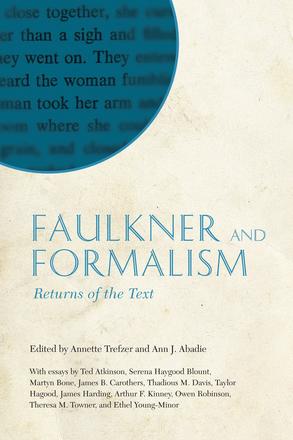
Faulkner and Formalism
Returns of the Text
Essays that explore current scholarship on the Nobel Laureate's work
Description
Faulkner and Formalism: Returns of the Text collects eleven essays presented at the Thirty-fifth Annual Faulkner and Yoknapatawpha Conference sponsored by the University of Mississippi in Oxford on July 20-24, 2008. Contributors query the status of Faulkner's literary text in contemporary criticism and scholarship. How do scholars today approach Faulkner's texts? For some, including Arthur F. Kinney and James B. Carothers, “returns of the text” is a phrase that raises questions of aesthetics, poetics, and authority. For others, the phrase serves as an invitation to return to Faulkner's language, to writing and the letter itself. Serena Blount, Owen Robinson, James Harding, and Taylor Hagood interpret “returns of the text” in the sense in which Roland Barthes characterizes this shift his seminal essay “From Work to Text. ”
For Barthes, the text “is not to be thought of as an object . . . but as a methodological field,” a notion quite different from the New Critical understanding of the work as a unified construct with intrinsic aesthetic value. Faulkner's language itself is under close scrutiny in some of the readings that emphasize a deconstructive or a semiological approach to his writing. Historical and cultural contexts continue to play significant roles, however, in many of the essays. The contributions by Thadious Davis, Ted Atkinson, Martyn Bone, and Ethel Young-Minor by no means ignore the cultural contexts, but instead of approaching the literary text as a reflection, a representation of that context, whether historical, economic, political, or social, these readings stress the role of the text as a challenge to the power of external ideological systems. By retaining a bond with new historicist analysis and cultural studies, these essays are illustrative of a kind of analysis that carefully preserves attention to Faulkner's sociopolitical environment. The concluding essay by Theresa Towner issues an invitation to return to Faulkner's less well-known short stories for critical exposure and the pleasure of reading.
Reviews
"Without losing sight of the many important historical and psychological arguments developed by critics of Faulkner in recent decades, the contributors to Faulkner and Formalism, in one excellent essay after another, bring us back to what makes him a great novelist—his mastery of the word, the sentence, the paragraph, the very form of fiction. "
- Eric J. Sundquist, Andrew W. Mellon Professor of the Humanities, Department of English, Johns Hopkins University
"'The text is back!' proclaims just one of these sparkling essays, but what these latest contributions to Faulkner scholarship really celebrate are the riches that continue to be mined by close readings of Faulkner's immense work, whether inspired by critical race theory, poststructuralism, or formalist aesthetics. The contributors to this volume bring to their own close readings a wealth of new insights about Faulkner's own attention to form and aesthetics, and the result is a collection that will ably serve classroom teachers and scholars alike. "
- Susan V. Donaldson, College of William and Mary